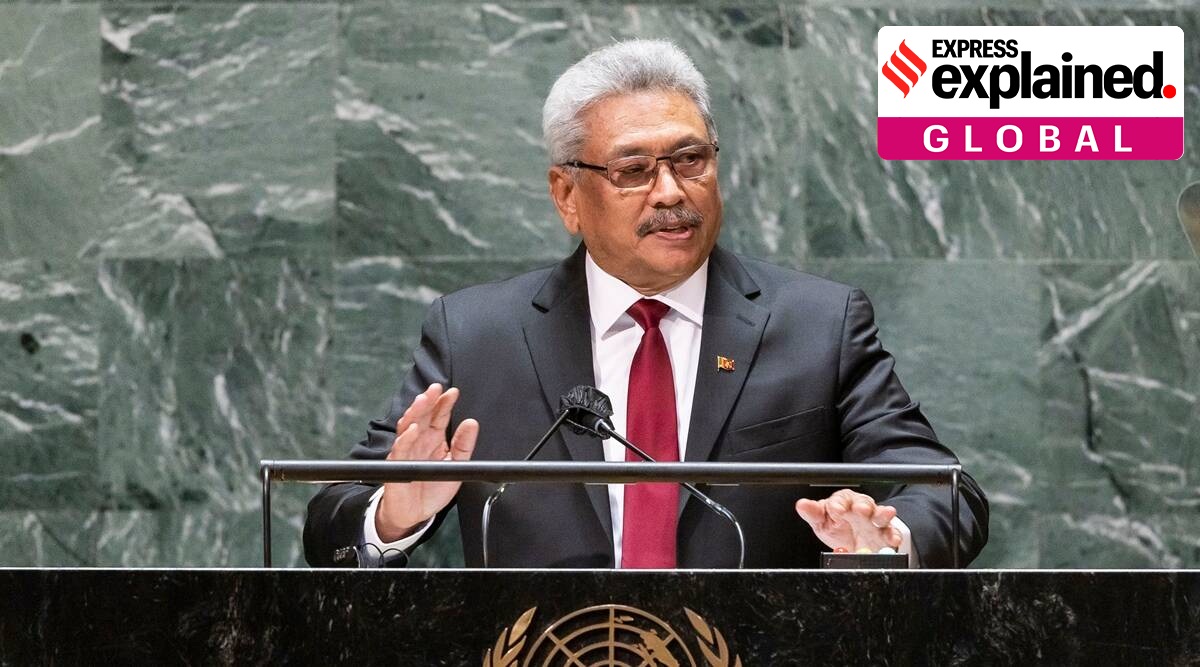Explained: Sri Lanka President, PM missing but not resigned yet; what happens now?
Wickremesinghe and Rajapaksa may be biding their time due to the rules of succession in the Sri Lankan constitution.

President Gotabaya Rajapaksa and Prime Minister Ranil Wickremesinghe of Sri Lanka have both announced they will resign, and so have a clutch of ministers.
But two days after these announcements, no one has actually resigned yet — and Sri Lanka’s divided political fraternity continues to struggle to come together for an orderly transition to a working national unity government. It had been announced earlier that the President would resign on July 13.
What does the Constitution of Sri Lanka say about succession?
This election has to be held within one month of the vacancy arising. The election is by secret ballot, and the candidate has to win an absolute majority.
Between the vacancy arising and the assumption of office by the new President, the Prime Minister will function as the acting President, and will appoint a minister of his cabinet to act as Prime Minister. If the office of the Prime Minister is vacant, the Speaker will function as the acting President.
So what does this provision mean in the current situation?
It means that if Wickremesinghe is still Prime Minister when — and if — President Rajapaksa resigns, he could function as the President, at least until Parliament elects a new President. It may also give him an edge in the subsequent election in Parliament for the new President.
This may partly explain the limbo in Colombo, in which the Prime Minister and several ministers are playing a waiting game as the President, who does not anymore have the support of the people who elected him less than three years ago, keeps the country on tenterhooks.
It also explains the insistence at the all parties conference held on Saturday that both Wickremesinghe and Rajapaksa must resign before a national interim government can be formed.
And where does the Speaker come into all of this?
The opposition party with the most parliamentarians, Sajith Premadasa’s Samagi Jana Balawegaya (SJB), is dead set against Wickremesinghe continuing in any office. Premadasa had stormed out of Wickremesinghe’s UNP ahead of the 2020 parliamentary election to form the SJB, ensuring that Sri Lanka’s “grand old party” won no seats at all.
Newsletter | Click to get the day’s best explainers in your inbox
Under the chronology envisaged by the all parties conference, after the two main resignations (President and PM), Speaker Mahinda Yapa Abeywardena would convene Parliament for the election of a new President, and would function as President in the interim.
But if Wickremesinghe quits before Rajapaksa’s resignation, Abeywardena, a Rajapaksa loyalist, steps in as the acting President. This too could break the efforts to form an all party government.
Where exactly do matters stand, then?
Competing statements from the Prime Minister’s Office, the President, and opposition leader Premadasa on Monday (July 11) threw light on the intense jockeying among the various camps. Early on Monday, the Prime Minister’s Office put out a statement saying the President had informed the Prime Minister “that he will be resigning as previously announced”.
Within hours, the Presidential Secretariat issued a statement saying all messages issued by President Rajapaksa “will be released by the Speaker after information is given to him by the President. Therefore… only announcements issued by the Speaker to be considered as official announcements by the President”.
Later in the afternoon, Premadasa also issued a statement, announcing that he was ready to “lead the program of stabilizing the country and building the country’s economy”.
In a statement reported by Newsfirst Lanka website, Premadasa said “the President, Prime Minister and the SLPP government had lost the mandate” of the people and that there was “no alternative solution other than the appointment of the government led by a new President and the Prime Minister”. He also warned that if “anyone opposes this or resorts to a subversive act from the Parliament, it will be considered as an act of treason”.